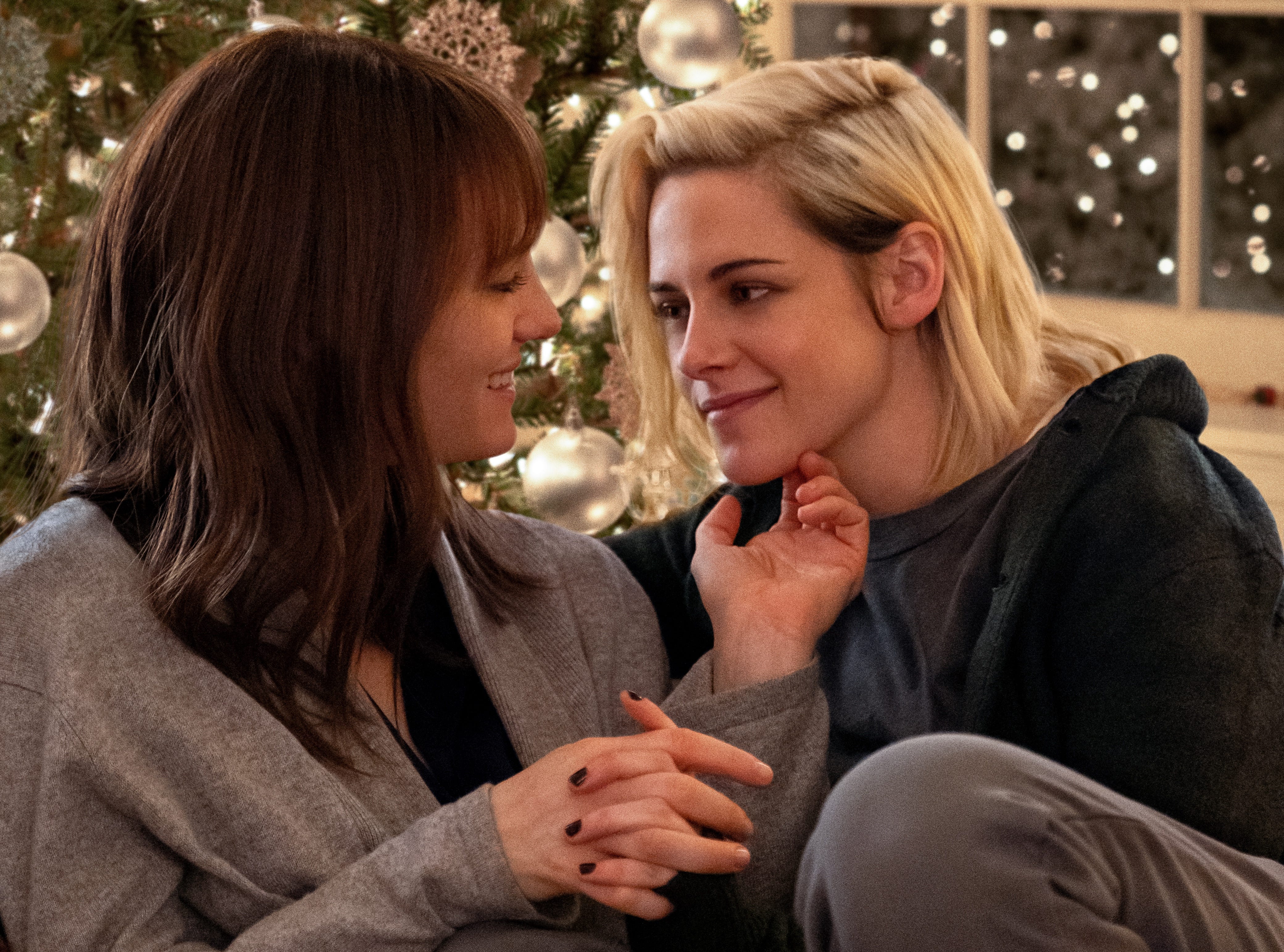Lots of surprises this year, both nasty and nice. I don't think I was expecting the Christmas movie - generally bland background fodder, something to put on as you disentangle the fairy lights, often as naff as Keith from marketing's conduct at the end-of-year party - to become hip in some way, but here we are. Actor-turned-director Clea DuVall's Happiest Season has generated a fair number of column inches and much social-media buzz these past few weeks by taking Christmas Movie Plot #001 - the awkward homecoming - and adding a 21st century twist. The homecoming is that undertaken by same-sex couple Abby (Kristen Stewart) and Harper (Mackenzie Davis), headed to the lavish residence of the latter's parents for the holidays. The twist is that those parents - conservative councilman Ted (Victor Garber) and his knowingly named, iPad-wielding wife Tipper (Mary Steenburgen) - have not one clue that their daughter is gay: Abby is introduced as a roommate and dispatched to a single bed in her hosts' basement, while Ted and Tipper set about pairing Harper up with a toothy male ex. The elements are in place for jolly seasonal farce, and DuVall keeps stuffing in funny people like last-minute stocking fillers: Alison Brie as Harper's wildly competitive sister, Audrey Plaza as a potential rival for Abby's affections, Ana Gasteyer as a local kingmaker. Our leads, meanwhile, are being forced into contortions to maintain the illusion of family unity and propriety. At one point, Abby strikes out to answer a midnight sext from Harper in amorous person, only to wind up being menaced by a Roomba in the family's utility cupboard. "Abby, what are you doing in the closet?," asks Tipper, coming to our heroine's rescue. You get the idea.
A percentage of the pleasure one draws from Happiest Season, it should be noted, is moment-specific. This is a light, bright comedy - the house and its surroundings are given a dusting of snow that looks pretty without ever compromising the general air of cosiness - about a large family that gets to hang out and hug in the same spacious kitchen. It is, in short, a Christmas movie that could have emerged at the back end of 2014, or 2017, or 2019; as escape from the unbearable heaviness of 2020, it probably won't be beaten this December. Yet another, more substantial reason for its success would be DuVall's realisation that a key component of any truly successful Christmas movie is simply good company: people we want to snuggle up close to in a darkened room on a cold winter's night. Recruiting Stewart and Davis, two of the best actors of their generation, was the masterstroke: it wouldn't have taken much to convert this pair into postergirls for modern same-sex couples everywhere, but they also have range, acting their thermal socks off whenever the script hands them an emotional beat. Elsewhere, DuVall provides cuddly strength in depth, the thespian equivalent of hot chocolate served with marshmallows and whipped cream. Even the notional antagonists of the piece (you'd really struggle to label them villains), the small-town, potentially small-minded, image-obsessed parents are played by performers as fundamentally likable as Garber and Steenburgen. We might wonder just how small-minded this small town is anyway, given that Plaza yanks Stewart into a seemingly flourishing cabaret to witness two drag queens leading a singalong to "Must Be Santa".
That development serves the film's fuzzily warming message: that most people and places are now more tolerant than we probably think, and that there's never been less reason to keep love a secret. (The film might have played differently after a different U.S. election result, but then the whole world would have looked different after a different U.S. election result.) The real enemy in Happiest Season - as it was in A Christmas Carol, as it may be in the actual season - is loneliness. The opening act takes particular expositionary pains to establish Abby as an orphan whose folks died at Christmas - the kind of contrivance these movies sometimes need to prime our tearducts. As Harper is pressganged into poll-boostingly heteronormative family photo ops, Abby has ample pause to wonder what she's doing here, whether Harper truly cares for her as the engagement ring in her pocket would suggest she hopes, and how much an Uber back home might be. To an extent, we're in her shoes, waiting for the last-reel party in which everybody's eye-to-eye in the same room - even Abby's gay best friend (Dan Levy), obliged to participate in this charade in the role of a straight ex-boyfriend - and working through their issues beneath an ominously towering tree. Like that spray-on snow, there's only so much substance to it. We're watching solid pros committing to broadly satisfying writing that brings a few new ideas to the table, that's all. Yet in its best moments, Happiest Season reminded me, happily, of last year's Bollywood romcom Ek Ladki Ko Dekha Toh Aisa Laga: another "breakthrough" that proved gently radical rather than confrontationally queer, which touched on nothing so Sapphic as to scare the horses. That in itself may count as a breakthrough, of course: an understanding love in any form is nothing to be scared of, and that the acceptance that follows from it is still the greatest gift any one of us has to give.
Happiest Season is now available to rent via Prime Video.

No comments:
Post a Comment